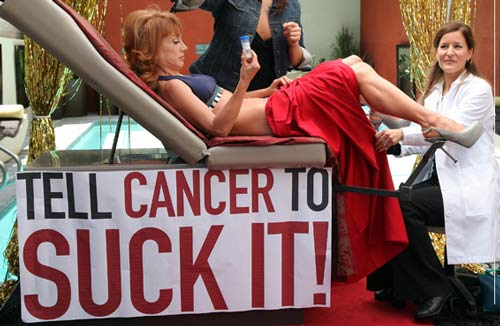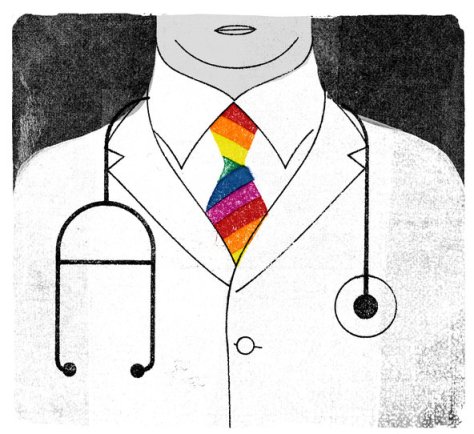There was once a doctor who told my ex-girlfriend that she didn’t have to go to a gynecologist because she was gay. In the car, she turned to me and said “imagine if my mom weren’t a nurse and I didn’t know that I should?” Truth be told, a lot of us don’t know that we should. And a lot of us don’t, for a ton of reasons. Science says we don’t.
A new study by the University of Maryland School of Medicine shows that about four out of ten lesbians are not regularly screened for cervical cancer. This percentage of lesbians not being screened as recommended is higher than it is for women overall. We as a queer community are no stranger to being marginalized in the health care system (or any system, for that matter.) So this may not surprise us. The study states that cervical cancer is highly treatable when detected early, and that women who are engaging in same-sex sexual activity can also get HPV (this is already known because science, but you’d be surprised how many people don’t actually think about it!) The study’s author, Dr. J. Kathleen Tracy, says the study highlights an often over-looked cancer disparity, the details of which will be presented at the 11th Annual AACR International Conference on Frontiers in Cancer Prevention Research.

Dr. Tracy and her team executed a standardized internet survey, sent to 3,000 women who self-identified as lesbians and 1,006 responded to the survey. Of these, 38% said they were not being screened for cervical cancer, while 62% said they were routinely screened.
The study states that the two most common barriers to testing for the 38 percent of lesbians who are not regularly screened were no physician recommendation (17.5 percent reported this) and not having a physician (17.3 percent.) In Dr. Tracy’s statements, she says that the overarching theme is a lack of communication between healthcare providers and their patients:
“We shouldn’t underestimate the importance of open communication between patient and provider,” Dr. Tracy says. “Our research showed that women who were open with their primary care doctors and gynecologists about their sexual orientation were nearly 2½ to three times more likely to have routine screening than those who did not disclose it. They also were more likely to be screened if their doctors recommended it and they believed that having routine Pap tests was beneficial.”
Basically the result of the study: it’s time for some real talk about Pap smears. And as much as I love talking with you about vaginas on the internet, this real talk should be with your doctor. If you don’t have a doctor like many lesbians in the study, you should get one. I live in a very happy, very privileged bubble where I have health insurance. But there are places where one can seek vagina treatment and consultation sans health care plan. While most of its media attention revolves around reproduction (preventing it or facilitating it), Planned Parenthood screens for all manner of STIs. There are also many other clinics that provide free or inexpensive screenings, and their reservation system is just a Google away.

If you’re putting off seeing a doctor, you may want to examine why. We’ve all had terrible doctor experiences, yes, and having a bad experience can put you off. But I’ll tell you what my father told me my senior year of high school the day after I wrecked my car. He opened his driver’s side door and said, “If you don’t drive today you never will again. So drive.” Don’t let one or even a hundred bad experiences stop you from being your own health care advocate. Are you scared about the costs in money and time? We’ve already talked about Planned Parenthood, which provides complimentary health care, but also consider this: preventative care costs far less in time and money than care will/does when an illness becomes an acute problem. Getting a pap smear can save you time and money in the long run.
Perhaps you see a doctor, but they may not have told you to get a pap smear. If you’re one of the women who hasn’t been told by a doctor to go get a Pap, we have to examine why. Do you turn red-faced and embarrassed every time your doctor mentions sex and say you are sexually inactive because you aren’t sleeping with men? Let’s all help society ovary-up about talking sex. Be open with your healthcare provider. Communication is a two-way street. It’s a normal thing to talk about, especially with your healthcare provider. And sex between two people with vaginas has risks associated with it, risks you should get tested for. Are you like my ex-girlfriend, whose doctor told her she didn’t need to because she’s gay? Demand better doctors, demand better training. This is hard, because doctors have authority and sometimes it’s scary to stand up for ourselves around authority figures. You know what my ex ultimately did about this doctor? Nothing. We don’t all have to be crusaders all the time But she didn’t go see her again. Instead she found another doctor, one who spoke about her body in gender neutral terms, one who took her seriously and didn’t tell her her asthma was in her head. And most importantly, one who understood that if you have a cervix, regardless of sexual orientation or gender presentation, you need a pap smear.

Studies like Dr. Tracy’s are important because it’s impossible to take responsibility for our healthcare if we are uneducated. How can we demand the healthcare we require when we don’t know what it is that we require? There are so many barriers to being educated and properly treated by doctors, some we have control over and some we don’t. Like when us women who are not straight report no sexual activity because we are assumed straight, because we were taught that sex is between a man and a woman, because we face ridicule or judgement from our doctors if we come out. When we are scared because we are uncomfortable in our bodies, because we don’t like to think about our vaginas if they don’t fit our outside gender presentation. Or perhaps this doesn’t apply to us because this study is about lesbians and we don’t identify as lesbians, we don’t even identify as female. When society tells us that if we have STIs, we are whores. Or we suspect something is wrong, but hope that if we ignore it, it will go away. There are just so many reasons that we have not to get tested for the HPV that can cause cervical cancer. But as the results of studies like these are discussed within our queer spaces, as queer communities we can support each other in the face of an imperfect health care system. This study and others like it can provide a platform, a jumping off point for our community discussing how we’re going to solve our own problems with vaginas, cervixes and their health. Because even with all these reasons not to get a pap smear, none of them outweigh the reason you should book your appointment for a pap smear right now.
It could save your life.
_______
Here are some resources Autostraddle has published in the past regarding sexual health, pap smears and going to a gyno while queer. We thought you’d find them helpful.
Lesbian Safe Sex 101: The Doctor is In (Also, the Cartoonist)
Health Care: Hard for LGBT People, Hardest for LGBT Old People








Comments
This is well-timed, I am getting my first pap smear on Monday! I am lucky enough to have a primary physician whose patient demographic includes a lot of queer ladies. Her exact words to me last week were: “I know you are a lesbian, and it’s great that you are a Gold Star and everything, but I am still making you get a pap smear.”
And then I giggled because my hetero, incredibly serious and straight-faced physician knew what “Gold Star” meant.
Thanks for writing about this article! Especially about the barriers to healthcare, its the kind of thing I can share with classmates. I am all about queering healthcare all the time, who’s with me?
I’m a lot like your ex, my mum is a nurse too, so I’m always questioning what my friends doctors tell them. My GP went to med school with my dad so I trust her, but god Ive heard some horrible accounts about doctors from other people, straight and gay alike.
What is dr. Tracy defining as “routine”? My doctor advised once every 2-3 years for me and my monogamous partner. I would say that’s routine, but this study doesn’t state where the cut-off is for labeling someone as not getting “routine” checks. So unfortunately, this article does nothing to address the question of “how often is often enough you aren’t having intercourse with a penis?”
My gyn also recommends a Pap for me every 3 years now. She said that’s the current recommendation for women who have no previous abnormal test results. She does know I’m a lesbian and in a monogamous relationship, but didn’t mention that as a reason for the every 3 years rec. It sounded like this is the latest recommendation across the board. (I think my insurance would still cover one every year, because she said I could still get one more often if I wanted to but she didn’t think it was necessary.)
The latest guidelines from the American Cancer Society say every 3 years, and only more often if you have had a previous positive pap smear or increased risk (like HIV). It doesn’t matter if someone isn’t having “intercourse with a penis,” it is the recommendation for everyone over 21 with a cervix (of any gender!) regardless of sexual history.
In Germany it’s once a year and I think many women even have them twice a year. But our health care is different, it basically covers everything.
Oh shit, that just reminds me of the time a (female) ob-gyn told me that it was basically impossible for me to get any STD’s from girl-on-girl sex.
The first thing she asked me was if I couldn’t have googled that question. I had already googled it, google was very concerned about my health, and it ended with me talking to her boss.
So doctors being misinformed about lesbians and health seems to be a global issue.
I heard this from the doctor who (eventually) gave me the HPV vaccine. “Oh, but you don’t need that, do you?”
I had a nurse at the gyno office ask me how I cleaned my silicone toys. After I told her she tried to tell me that I should be using rubbing alcohol!!! On Silicone!!! I had to interrupt and tell her how that would destroy the surface of a silicone toy. then I gave her a mini lesson on sex toy maintenance. All I could think was “how many people has she told that misinformation to?”
This is a really interesting article. It is kind of sad that it can be so much harder to get properly informed by doctors just because of who you choose to sleep with.
Hmm, I keep reminding myself that despite being a virgin I should probably go to a gyno one day soon…
But then again going to the dentist makes me feel violated I don’t know how I could handle a gynecology exam. (Though the fact that the gynecologist presumably won’t be stabbing me with metal instruments or filling me with Novocain would probably help.)
pick a female gyn, talk to her beforehand, maybe just make an appointment for talking about it first? would it help to have someone hold your hand through it?
if the gyn isn’t nice and understanding about the concerns you’re having don’t go back to them!
It probably would help to have someone there with me but I recently moved for school and have no friends or family here… (Nor do I have a car or extra money really…)
Gah, Taking care of yourself is hard.
Definitely go. I was in your shoes not too long ago. I finally convinced myself to go and told myself it was about taking responsibility for my health (I had to tell myself this over and over to keep from chickening out).
What really helped my wrap my mind around the exam was online research. A quick search will bring up dozens of sites that explain the process and exactly what the doctor will ask/say/do. Knowledge is power — read about it over and over until it sounds normal. Also, tell your doctor it’s your first exam. My doctor explained every step before the exam and also during it. Lastly, if you’re worried about the physical contact aspect of the exam, please know that a clinical touch is 100% different from a sexual touch. It will be okay — find a doctor and make an appointment.
Thank you, thank you for this article.
I’m the daughter of a nurse as well for which I thank my lucky stars (even if she has enabled my mild hypochondria) because she taught me how to be my own fierce healthcare advocate.
I’ve been out to all of my GYNs and none of them has tried to suggest that I don’t need routine pap smears, STI testing, etc. And if there’s ever been a slight hesitation, all I’ve pretty much had to do is narrow one eye and they shut up. It frustrates me that this is not talked about more often, so again thank you. :)
This is so true…luckily I have not had any doctors doubt me or say I don’t need things. Which is good, because although I’m a gold star, I still got HPV!! Which seems to be mostly behaving itself for me (I had to get a follow-up, but there wasn’t anything concerning), but still could lead to cervical cancer.
One thing to keep in mind when you talk to your doctors-the newest recommendations are that screening with pap smears should begin once a woman is 21 or older (regardless of sexual activity). If you have normal pap smears, you only need to be screened once every three years (if you are under 30) or once every five years if you are over 30 and your doctor is screening with a pap smear and HPV DNA test.
http://www.uspreventiveservicestaskforce.org/uspstf/uspscerv.htm
thanks so very much for the reminder, been meaning to get in for that regular checkup…and a girl can always know Planned Parenthood is a safe space to spread ’em!! I just found out you can make an appointment request online, which can help get over that initial resistance, if there’s anyone out there like me who pretty much just avoids doctors like the plague. Once again, the internets come to save the day, making life just a little easier. Yay.
I’m in NZ and I prefer to see a gyno, rather than my GP. I go to Family Planning (the NZ equivalent of Planned Parenthood) and it’s awesome! Unlike a lot of GPs, the doctors at FP spend all day talking about sex and genitalia and (in my experience) they are totally at ease about it. Anything you can say or ask, they have no doubt heard many times before. And for anyone in Auckland NZ, the New Market Family Planning office is excellent and totally queer-friendly. And they have never suggested that I not get pap smears because of my orientation.
This is when it comes in handy having family members in health care, if I have any questions I can go to them and get a clear answer
I have had two doctors tell me that because my partner is a woman, I don’t need Pap smears. Luckily Autostraddle set me straight (hah) on that one.
For various reasons I didn’t see a gyno until I was about 23.
What helped both myself and my doctor was handing her a written paper with the following information: That it was my first time, that I mostly slept with women, and that I had a history of horrible cramps.
Getting those things out of the way made me calm down and helped her to guide my exam- and I got lucky, because she’s been pretty great.
That’s a great idea!
[…] Cancer …HealthCanal.comResearch reveals most women are unaware STDs cause cancerGatton StarAutostraddle -Manila Bulletinall 34 news […]
[…] of 10 Lesbians Not Routinely Screened for Cervical Cancer …HealthCanal.comThe Reporter -Autostraddleall 35 news […]
My doctor (head of the healthcare center at my university) told me lesbians couldn’t get STI’s, even when I told her that I was sleeping around
She also told me I didn’t need to ever get pap smears, I told her “I might be gay but I still have a cervix”
Then I told her I was getting a new doctor.
THANK YOU for this informative issue on an important topic! And thank you autostraddle for taking care of not just our lady woes, but our health too.
[…] of 10 Lesbians Not Routinely Screened for Cervical Cancer …HealthCanal.comGatton Star -Autostraddle -Manila Bulletinall 37 news […]
I think Lauren above asked what Dr. Tracy defined as “routine.” If you go back to the original article by clicking on the hyperlink, it appears to insinuate that routine is every 3 years. (“The percentage of lesbians not being screened as recommended is higher than for women overall. According to information compiled by the Centers for Disease Control’s Risk Factor Surveillance System (BRFSS), 13 percent of women have not had a Pap test in the last three years.
Read more: http://www.umm.edu/news/releases/lesbians-and-cervical-cancer.htm#ixzz29sfJKczZ“)
As an aside, I am a nurse practitioner and have been performing paps for the past 3 years…please, please, please don’t let your anxiety get in the way of getting one. I know and understand that that first one is a big deal (I didn’t get my first one till I was 26). But I promise that the the exams only take a couple minutes long. And in the right and capable hands of a good physician/NP they are usually painless. :-)
The doctor who did my first pap smear, by the way, was one of those who told me I didn’t need anymore for the rest of my life, since I only slept with women. Good thing I am in the medical field and knew that to be untrue! I wonder how many lesbians have gone without them erroneously thinking they aren’t at risk for HPV.
Going to a gyno seems like such an American thing. I would just go to the GP for a Pap smear here, and it would be free under Medicare. Pre sure anyway.
No, that would not necessarily be ‘an American thing’. I am an Aussie and when I was living in Germany I was interested to note that GPs there don’t do Pap smears, either. You go to a gyno for them. I literally just had one last week (at the GP, and yes, it’s a bulk-billed Medicare thing), and it seems that the recommendation here in Oz is once every 2 years.
FYI, women aren’t the only ones who need pap smears. Anybody who has a cervix needs them.
Tali, very true. This study only addresses lesbians in relation to heterosexual women, which may be why most of us were discussing cis-women/lesbians. But (correct me if I’m wrong) I assume you may be talking about transmen or intersex people. In my clinical experience, transmen are even less likely to get pap smears for a multitide of reasons…Let’s hope they are the next subgroup to be addressed. I’ve seen transmen with HPV and abnormal paps, as well. I used to work in a super progressive health clinic and was proud that we were ahead of the curve in regards to the sexual health of everybody (specifically LGBT people, though), but that is definitely not the norm in healthcare. I fear that most primary care providers in non-urban settings don’t understand anything other than heteronormative, gender binary health needs.
As a lesbian patient, I have been the victim of my doctor asssuming I am heterosexual and in need of birth control, and me having to call her out on it. And as a healthcare provider at a predominantly LGBT clinic, have had patients assume I have a husband and kids just like them and have them proudly announce that they “aren’t gay, either” (because I wear a ring on my finger for my civil union). It can be awkward, and I think nursing and medical schools need to do a much better job still of addressing diversity and heterosexism in healthcare.
I know I need to get onto this stuff although not urgently, but my hymen isn’t properly broken and won’t do so easily. Will that cause problems?
Haha Western Australia has this covered!
“Every woman over 18 years who has ever had sexual contact should have regular Pap smears. This includes women who:
are no longer sexually active
have only had one partner
are divorced or widowed
have gone through menopause
are lesbians”
http://www.health.wa.gov.au/cervical/papsmears/ps_doineed.cfm
The article is based on the assumption that pap smears have been proven to identify cervical cancer in an early stage…I thought that had not yet been proven? Women should be screened, but what is the proper test? Great if it is a pap smear, but not do great if not.
Pap tests have been proven beyond a shadow of a doubt to be not only the best but the ONLY way to detect cervical cancer early. By the time you have other symptoms like pain with intercourse it is almost always too late. The cytology that is done for a pap test can detect very early pre-cancerous changes, but a simplified image of what they are looking for is here: http://www.menstrual-cycle.info/images/Pap-smear-1.jpg The original studies on pap tests are quite old, if you are curious about the latest cervical cancer research you can find it here: http://www.cancer.gov/cancertopics/types/cervical.
Great article on a really important topic! Just wanted to mention that Planned Parenthood’s services are not always “complimentary.” They are definitely reduced cost, but that cost varies. Here’s a link to my local PP with the costs listed for many of the services they offer:http://www.plannedparenthood.org/health-center/centerDetails.asp?f=2805&a=91650&v=details#!service=womens-health
Wow I remember going to the doctor for a papsmear right before I went off to college. I was 17 and this was my first time even going to the doctor by myself. They asked about if I had sex and about my sexual orientation. I told them I wanted a pap smear and a variety of other test done before I went off to school. My first doctor was male and he was supposed to perform the check up. He went and got another doctor who was female and I as I was ready to get my pap smear she told me that I didn’t have to get one because I didn’t have sex with men. I was very confused and questioned it. I ended up not getting any std test or a pap smear done and told my mom about the situation. She & I were very upset because a woman’s health does not depend on whether or not or even who the have intercourse with.
[…] that gay women don’t need Pap smears. A 2012 University of Maryland School of Medicine study found that four out of 10 lesbians were not regularly screened for cervical […]
[…] homosexual women don’t want Pap smears. A 2012 University of Maryland School of Medicine research found that 4 out of 10 lesbians weren’t recurrently screened for cervical most […]